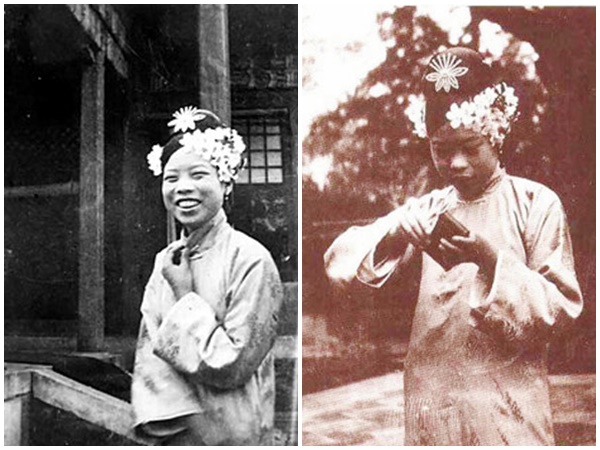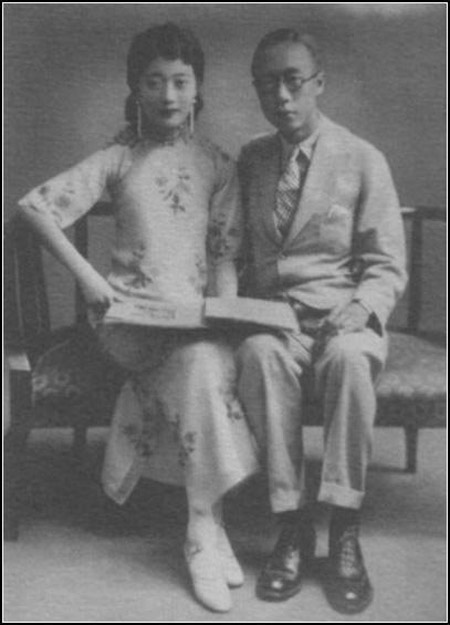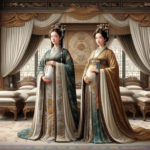Throughout the feudal dynasties of China, competing for favor in the harem was not uncommon. While the concubines vied to win the emperor’s heart, there was one concubine who decided to divorce the king.
In the spring of 1921, when King Pho Nghi was selecting a queen, both Van Tu and Uyen Dung were among the noblewomen recommended. Van Tu, although not beautiful, was favored by King Pho Nghi. Empress Doan Khang, the king’s mother, chose Uyen Dung as the queen and Van Tu as the concubine.

Concubine Van Tu
In the beginning, Uyen Dung was jealous and sought to overthrow Van Tu. Van Tu, who was not affectionate towards the king, had an introverted personality and did not like to talk much, making it difficult for her to express herself. From a young age, she loved reading poetry and always lived alone in the Thuong Xuan palace to accompany her books. King Pho Nghi even invited an English teacher to teach her. Living in the depths of the palace, Van Tu gained more knowledge.
Shortly after, the king and the royal family were forced by Phung Ngoc Tuong, a general of the Kuomintang, to leave the palace and live in Thuan Than palace in Beijing. Van Tu wanted to improve the atmosphere in the palace and maintain an equal status with the king. She often came up with ideas for the king, but the king turned to the Japanese, hoping to restore his position.
Van Tu did not want King Pho Nghi to collude with the Japanese, so she advised him many times. The king was disgusted and became cold towards her, especially when they moved to Togiwa in Tianjin. The king even mistreated Van Tu. During meals or strolls, Pho Nghi often abandoned Van Tu and went with Uyen Dung. At that time, the king and Uyen Dung lived on the second floor, while Van Tu lived below, never going upstairs and feeling like a stranger.
The relationship between Van Tu and King Pho Nghi became colder, their affection waning and without any lingering feelings. Therefore, she escaped and found a lawyer, making a public statement about her divorce with King Pho Nghi so that everyone would know. One of the main reasons for their divorce was that King Pho Nghi did not fulfill his husband’s duties, as they had been married for 9 years but Van Tu was still a virgin.

Emperor Pho Nghi and Queen Uyen Dung
At that time, Pho Nghi was no longer the emperor, but this still surprised everyone. The press called Van Tu the “revolutionary consort”. When King Pho Nghi received the summons from the court, he was extremely frightened and reluctantly agreed to the divorce. He became the first emperor to be divorced by a consort.
When Van Tu found a lawyer to handle the divorce proceedings, Pho Nghi was shocked, considering it an unprecedented event. However, Van Tu was determined, and eventually, an agreement was reached: Pho Nghi would compensate Van Tu with 500,000 yuan for living expenses, and in return, Van Tu agreed to never remarry. After the divorce, Van Tu returned to Beiping, which is now Beijing.
Although she returned to a common life, Van Tu still maintained her habits from the palace. She hired four maids to assist her. Every day, she changed clothes and washed her hands three times, with hot water added each time, and the last rinse should not scald her hands. If the maids did not do a satisfactory job, they would be scolded by her. The extravagance did not last long, and the compensation money from her ex-husband gradually ran out. The days of Van Tu staying at home reading books also ended.
Van Tu changed her name to Pho Ngoc Phuong and became a teacher at a private school. A new life began, and Van Tu started to smile, enjoying being around children who loved and admired her. Her happiness at that time was simple, the happiness of freedom.
Not long after, her identity as the last consort of the Qing dynasty was discovered. People crowded around her house, turning her life upside down. Van Tu had to leave the school in tears. Afterwards, she fell into difficult times, working as a paper box sticker and even a construction worker to make a living.
In 1949, after the victory of the resistance war in China, Van Tu became a proofreader for a newspaper and later married Liu Zhandong, an assistant to Li Zongren, the President of the Republic of China after T.V. Soong resigned in 1947.
The wedding was held ceremoniously at Dong Hung Lau, a famous venue in China at that time. Liu Zhandong entrusted Van Tu with all the savings accumulated over twenty years. After getting married, Liu Zhandong opened a small rental car shop. Van Tu later quit her proofreading job. The couple had a housemaid, and Van Tu enjoyed peaceful days reading books and painting. This kind of life lasted for two years until Liu Zhandong went bankrupt, and the newly built house they worked so hard for was lost.
Before the two could escape to the south, Beiping was surrounded. Liu Zhandong listened to his wife’s advice and presented himself to the authorities. Thanks to his good performance, he stayed to work in the sanitation team of Tay Thanh district in Beijing, with a low income but enough to support their lives.
Van Tu and Liu Zhandong lived in a room of only 10 square meters. Van Tu took care of the housework and household chores. However, the couple had no children. Due to poor health, Van Tu passed away at the age of 45 in 1953.
Unspoken rules that forced Qing dynasty concubines to stay silent while being inspected by the emperor
When in the presence of the emperor, all concubines must maintain silence. This is a mandatory rule, and no one is allowed to disobey.





































